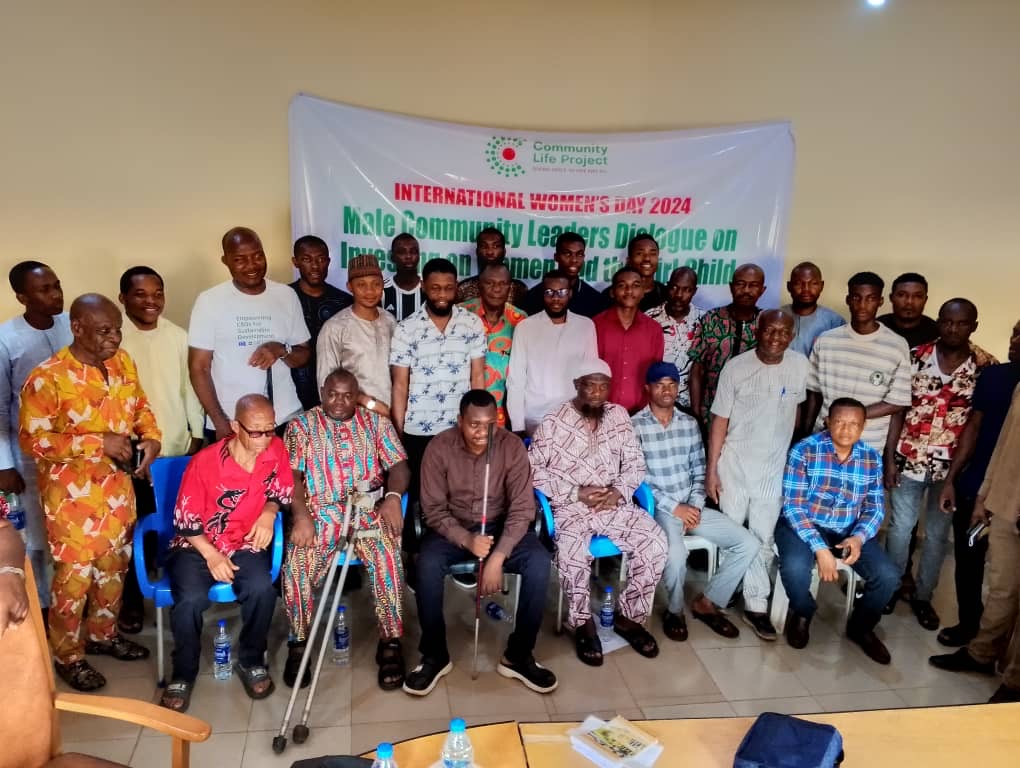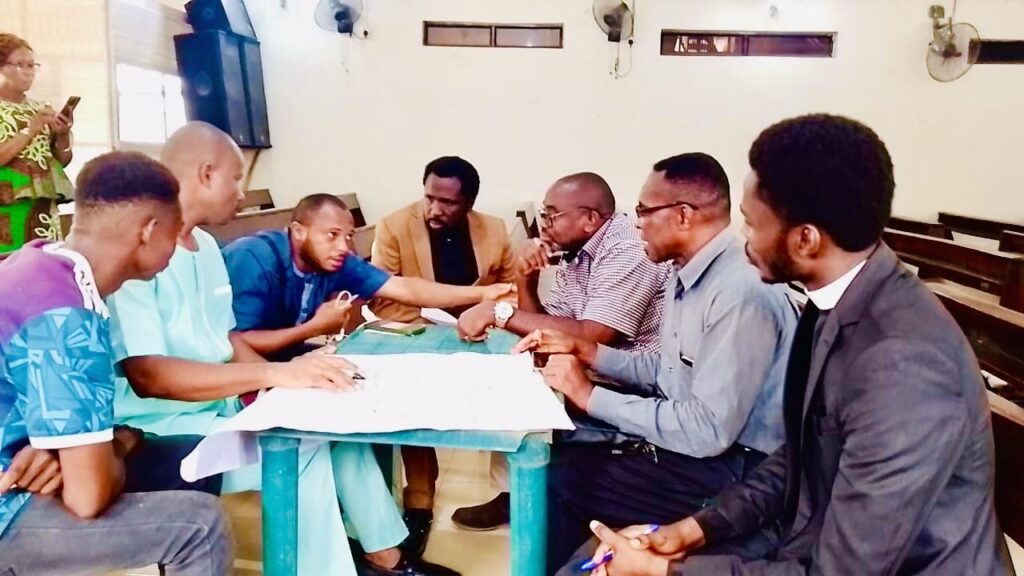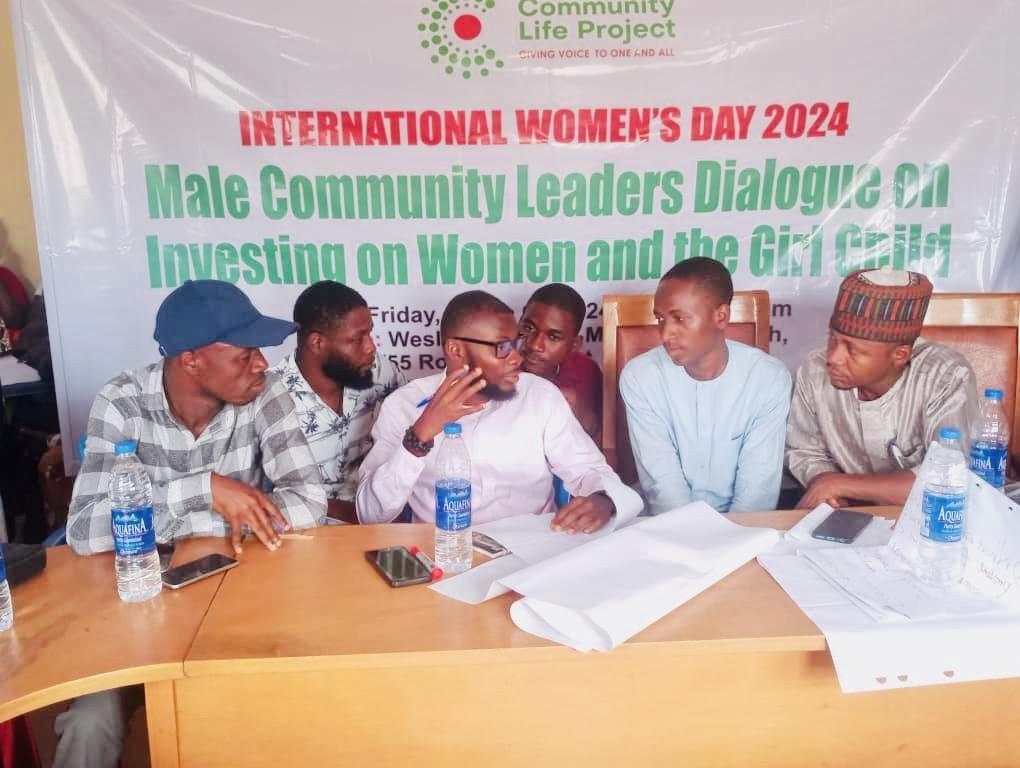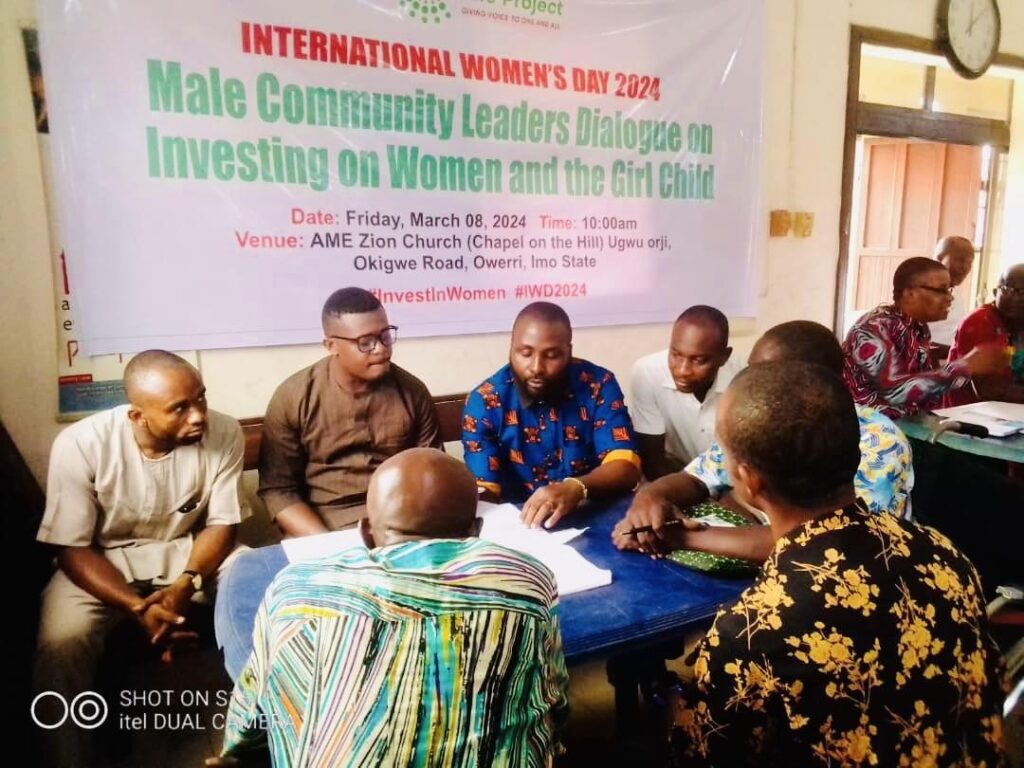To commemorate International Women’s Day (IWD), CLP invites men to dialogues on importance of investing in women and girl-child in Enugu and Imo States
In the Southeast region of Nigeria, particularly in states like Imo and Enugu, women face systemic undervaluation, marginalization, and gender-based violence due to entrenched cultural norms and societal expectations, limiting their access to education, economic opportunities, and decision-making positions. Traditional beliefs and patriarchal structures perpetuate disparities in inheritance rights, employment, and political representation, exacerbating their undervaluation. Pervasive stereotypes and biases further constrain women’s potential for socio-economic advancement, hindering the region’s development.

The participants in the dialogue on the importance of investing in women and girl-child in Enugu State
In an effort to address these problems, prevent gender-based violence (GBV), and uphold the dignity of womanhood in Southeast Nigeria, the Community Life Project, with the support of the Ford Foundation, invited male community leaders in Enugu and Imo to hold dialogues on International Women’s Day to discuss the benefits of investing in women and the girl-child in families and communities. The discussions covered what families stand to gain by investing in women, the challenges, and the factors preventing families and communities from investing in women and the girl-child, as well as solutions to these challenges.

Community Leaders in the workshop to discuss the importance of investing in women and girl-child in Imo State
The dialogues with the theme ‘Workshop on Investing in Women to mark International Women’s Day (IWD) 2024’ took place on March 8 in the Imo and Enugu States.
Why CLP Invited Men to Discuss Women’s Issues on International Women’s Day (IWD)
Ngozi Iwere, the Executive Director of Community Life Project, said that men are powerful influencers in families and communities and they have a critical role to play in accelerating the changing of cultural practices and norms that undervalue women and girls-child.
She noted that men hold the key to unlocking new gender norms at the community level that will enhance the status of the girl-child and prevent women from becoming less vulnerable to gender-based violence, poverty, and other consequences of inequality.
She added that men were invited because one of the root causes of gender inequality and gender-based violence lies in the belief of the preference of the male child over the female child, and it is a sensitive cultural issue. She explained that CLP believes men are influencers and enforcers of norms and cultural practices and they are in the best position to address it.
“This initiative was carried out purposely to prevent GBV, deeply entrenched in patriarchal values, norms, and practices especially son preference over girl-child and the poor status of women and the girl child which contribute significantly to making women and girls vulnerable to GBV. So we wanted to address this by getting communities to uphold the dignity of womanhood.
“There is also a pervasive belief that women are inherently inferior to men, and that their primary life purpose is to get married and take care of the domestic life of the family. They are often seen as property of the man. This not only makes them vulnerable to GBV but also makes it difficult for them to receive the needed support from their families and communities. So promoting appreciation for and enhancing the dignity of womanhood will help solve this problem,” she explained.
She further noted that it is important to mark grassroots action on IWD, stating that CLP is committed to inclusion to ensure that people at the grassroots have platforms and opportunities to participate in sub-national, national, and global event initiatives. She summed up that IWD is one of such opportunities to carry the people at the grassroots along.
She said: “We wanted men, especially those who are community leaders and influencers, to dialogue on how to change the mindset at the community level and change both the narrative and enhance the status of women and the girl within families and communities. We believe that men are better positioned to champion this cause.”
Chinedu Eze, a facilitator in Imo State, expressed his joy over participating in dialogues that talk about the significance of investing in women and the girl-child, adding that men need to harness the potentials in women for national growth and development.
He stated: “It is high time we allow women to hold key leadership positions, most especially at this trying time of the nation Nigeria. Women are created by nature as perfect managers. So, investing in women and girls will have a positive impact on our families and communities.”
She further noted that the solutions provided in the dialogues will be used in creating awareness among their circle of friends and groups that they belong to on the need to invest in women and the girl-child in the families and communities.
He, however, advised men in the South-east to give women a chance to take leadership positions because they could be the key solutions looking for to solve the challenges this nation is currently facing.

The participants from Enugu State brainstorming on the solutions to the challenges of investing in women and girl-child
Achime Chijioke, one of the participants from Enugu State, also expressed his delight over the event, stating that a well-nurtured woman and girl-child are an asset to society and she will, in turn, train good children that will better the community and family.
She added that the advantages of investing in women are numerous but top of the list is gaining a good and productive society, family and people in general, saying that the family is the smallest unit of the society and once the family is good as a result of a good mother that nurtures and grooms them, the society will automatically be ok.

The participants from Imo State brainstorming on the solutions to the challenges of investing in women and girl-child
“Creating grassroots awareness on the very need to invest in women and the girl-child in general. Educating parents especially the unenlightened ones on the need for this important venture. Providing a level playing ground through the NGOs that will make laws through the government and enforce it seriously.
“My advice for men in the South East is that they should understand that when a girl-child is properly trained, a generation will not be lost and they should know that every child is equal, both male and female,” he noted.
Ogbodo Emmanuel, one of the participants in Imo State, assured that the efforts and commitments put in place by CLP to bridge the gap of gender inequality will yield positive results, especially now that men are involved in the dialogue. He encouraged men to embrace equality and abandon the notion that ‘it is a man’s world’, asserting that in reality, “it is Human’s world.”
He encouraged young girls to have an unlimited dream and pursue it and advised men in South East that it is essential to invest in women because they carry and nurture the future (children/youths) and must be properly invested in so that they will be active players in society and nation building. He added that no investment in humans is a waste irrespective of gender because there is no superior gender.
He noted: “It is important to invest in women and girl-children because they are human beings too and deserve equal treatment with men and if they are invested in they will perform well. Investment in women or girl-children is an investment in the nation’s human capital building because it is the woman who stays at home to raise children so if we invest in them they will raise intellectual and morally sound children and youths who will become productive and responsible citizens.
“Investing in women and girl-children increases the number of professionals in every field and brings healthy competition in any field and in this case, the people will have to choose from the best to serve in every field of endeavor. Investment in women and girl-children also reduces crime rates and social vices in women, improve educational system,
He, however, promised to invest and train all his girl-children and encourage everyone around him to do so, noting that he will always emphasize on the importance of investing in women through sensitization and campaigns in rural areas.
Solutions proposed by participants from Imo and Enugu include: open government partnerships to combat ignorance, ensuring peace and conducive educational environments, political stability, foundational upbringing by parents, education awareness emphasizing investment in the girl-child, sensitization of families and communities, policy formation and enforcement for girl-child education, granting free education, reorientation by religious leaders, equal opportunities for women, enlightening society on women’s importance, combating gender biases, enhancing girl-child exposure for societal representation, improving financial situations, creating employment opportunities, reviewing harmful traditions, promoting women’s education through socio-cultural and religious channels, increasing female participation in society, integrating gender affairs into the school curriculum, and empowering women through family and societal support.
Among other solutions suggested are: advocacy against gender inequality, support for NGOs, subsidizing education and skill acquisition, promoting gender-neutral upbringing, women’s inclusion in politics and governance, legal rights for women and girls, awareness campaigns, NGO creation, sensitization by religious and traditional leaders, women’s self-help initiatives, organizing seminars and orientations, policy and legal protection, community sensitization, celebrating the female gender, adopting gender equality-focused cultures, providing access to resources for the underprivileged, recognizing education’s role in community and national development, promoting peace and governance through women’s education, and implementing gender equality policies.
The participants are committed to going back to their community to begin to address these issues and change the norms and mindset within their families and reference groups in communities. The initiative held by CLP on IWD has helped to bring out more male champions and advocates of the rights of women and girls-child being powerful influencers and powerful voices within communities and families and men are in a position to change the narrative.
